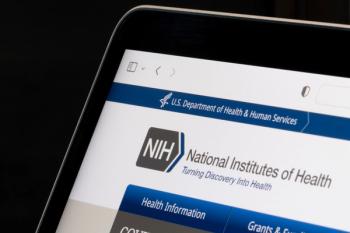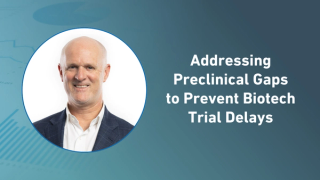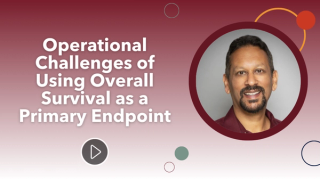
Regulatory
Latest News
Latest Videos

More News

With global supply chains inherently vulnerable to trade policy shifts, the consequences for clinical research can be significant without proactive planning. The eight core elements of a tariff contingency plan are outlined.

How a strategic approach to the pre-investigational and investigational new drug application process can be used as a business and clinical catalyst.

Capturing insights from clinical research professionals on the key trends and challenges shaping drug development today, from those in clinical trial operations and site relationships, to technology and AI, and the evolving regulatory and policy terrain.

Regulatory inspections of interactive response technology systems have surged 140% since 2022, signaling intensified global scrutiny of data integrity, randomization, and system validation in clinical trials.

The latest federal shutdown leaves the NIH operating with just one-quarter of its staff to maintain patient care at its Clinical Center, while broader funding cuts and proposed agency consolidations threaten the future stability of US biomedical research.

In today’s high-cost R&D environment, pharma success depends less on cost-cutting and more on evidence-based portfolio decisions, niche-buster strategies, and real-world data-driven indication expansion to maximize both ROI and patient outcomes.

Pharma R&D faces rising trial complexity, high costs, and patient and investigator shortages, driving the need for adaptive models and data-driven strategies to speed therapies to market.

As clinical research becomes increasingly digital, integrating rigorous cybersecurity assessments into CRO selection and qualification is essential to safeguard sensitive data and ensure trial integrity.

In an era of constant policy change, timely real-world data is emerging as pharma’s most critical tool to track patient access, anticipate shifts in treatment utilization, and improve outcomes in real time.

A quick look at FDA’s 2025 transparency moves, what CRLs are (and aren’t), how FAERS works and its limits, who can report, and where the agency is applying AI.

The designation supports expedited development of SAR402663, Sanofi’s one-time gene therapy designed to reduce treatment burden and slow vision loss in patients with wet age-related macular degeneration.

New guidance and technology advances are reshaping eClinical systems, positioning them as tools to accelerate enrollment, improve data quality, and reduce site and patient burden.

In this video interview, Sunny Kumar, MD, partner at Informed Ventures, discusses how FDA guidance and investor expectations are shaping resilient trial designs that use adaptive methods, virtual controls, and decentralization to lower costs and accelerate patient access.

In this video interview, Sunny Kumar, MD, partner at Informed Ventures, explains how organizational complexity, regulatory caution, and cultural risk aversion slow innovation in clinical trials, while tools like generative AI may help reduce operational barriers.

FDA approves COVID-19 vaccines from Moderna, Pfizer-BioNTech, and Novavax targeting the LP.8.1 sublineage of SARS-CoV-2, with eligibility limited to adults aged 65 years and older and those with underlying medical conditions that place them with a high risk for severe disease.

Craig Lipset, co-chair, Decentralized Trials & Research Alliance (DTRA), and Kyle McAllister, co-founder, CEO, Trially, discuss how research sites are navigating political funding pressures, adapting to NIH budget constraints, and leveraging new cost-containment strategies to sustain clinical research.

The FDA will now publish adverse event data from FAERS on a daily basis, marking a major step toward greater transparency in drug development.

This explainer unpacks how recent US policy shifts are reshaping diversity, equity, and inclusion in clinical research, exploring the ripple effects on patients, sites, sponsors, and investigators.

The Supreme Court has ruled 5-4 to allow the Trump administration’s NIH funding cuts to continue, impacting more than 1,700 medical research grants in areas including heart disease, HIV/AIDS, Alzheimer’s disease, and mental health.

In this episode of the Applied Clinical Trials Brief, we spotlight a recent video interview in which Jon Walsh, founder and chief scientific officer of Unlearn.AI, shared how digital twins can improve trial efficiency, enhance patient-centric designs, align with regulatory expectations, and accelerate access to new therapies.

In this episode of the Applied Clinical Trials Brief, we spotlight a recent video interview in which Jon Walsh, founder and chief scientific officer of Unlearn.AI, shared how digital twins can improve trial efficiency, enhance patient-centric designs, align with regulatory expectations, and accelerate access to new therapies.

With approval to proceed, the Phase II trial (NCT06092034) of RP-A501 for Danon disease restarts under an optimized dosing and immunomodulatory strategy.

An overview of how recent funding reductions are reshaping clinical trial operations, from site sustainability and patient recruitment to trial design and long-term strategy.

Breakthrough Therapy Designation was based on results from the Phase II IDeate-Lung01 trial (NCT05280470), which demonstrated clinically meaningful benefits in patients with extensive-stage small cell lung cancer treated with ifinatamab deruxtecan.

Ron Lanton, partner, Lanton Law, explains how shifts in policy and government guidance could reduce public participation and complicate the design and recruitment of future vaccine trials.













